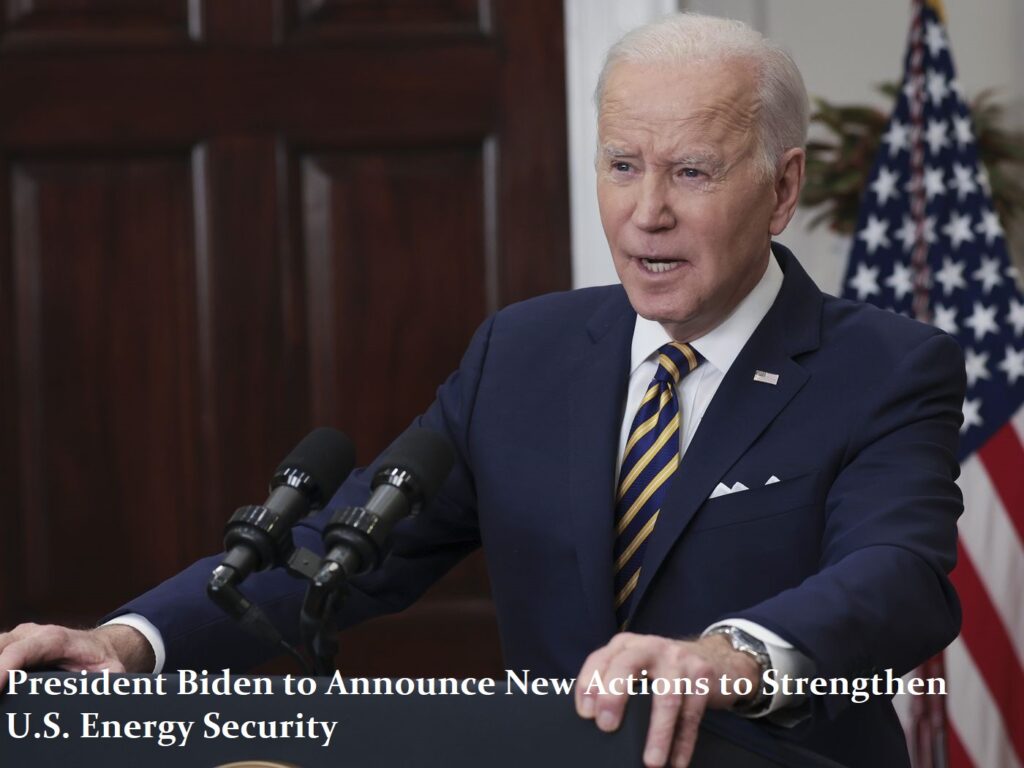President Biden to Announce New Actions to Strengthen U.S. Energy Security, Encourage Production, and Bring Down Costs

President Biden has vowed to do all in his power to counteract Putin’s price hike at the pump, and he is following through on that promise. With average prices down by roughly $1.15 per gallon since their peak in June, and just about 30 cents above levels on February 24, when the war in Ukraine started, gas prices decreased this summer at the fastest rate in more than a decade. In fact, for 15 of the past 18 weeks, gas prices have decreased. An industry analyst claims that $3.39 is currently the most popular pricing nationwide.
Also Read:- Now Open Beta Version Of The Student Loan Forgiveness Application- Biden Administration Says
President Biden has ordered his administration to take more steps to improve energy security, address the supply shortage, and reduce costs.
A Notice of Sale for 15 million barrels from the Strategic Petroleum Reserve (SPR) that will be delivered in December is being released by the Department of Energy (DOE) tomorrow morning. This sale will bring to an end the unprecedented 180 million barrel drawdown that the President announced in the spring and contributed to the stabilization of the crude oil markets and the decline in gas prices. The President is also requesting that DOE be prepared to proceed with further sizeable SPR sales this winter if necessary owing to Russian or other activities upsetting the world market.
Second, the President declares that the Administration plans to repurchase crude oil for the SPR when prices are at or below $67-$72 per barrel, increasing global demand when prices are in that range. The DOE is completing a regulation that will enable it to negotiate fixed price contracts through an open bid process for goods delivered at a later date as part of its commitment to guaranteeing replenishment of the SPR. By using a repurchase strategy, taxpayers will be safeguarded and the demand for crude oil in the future will be more certain. This will incentivize businesses to invest in production immediately, enhancing American energy security and bringing down energy prices that have risen due to Putin’s war in Ukraine.
The President is urging businesses to pass on lower energy costs to customers right away. With the retailer margin over the refinery price being more than 40% over average, the profit that energy refining companies are currently making on each gallon of gasoline is roughly double what it is at this time of year. The average cost of a gallon of gas has been increased by more than $0.60 as a result of these excessive industry profit margins, which have maintained pump prices higher than they should be. It is unacceptable to keep prices high even as input costs decrease, and the President will demand that businesses pass on their savings to customers immediately.
Continuing to Use the SPR to Advance U.S. Energy Security
In March, in response to Putin’s further invasion of Ukraine, the President ordered the largest-ever release from the SPR and achieved record cooperation with allies and partners to release crude oil from their reserves as well. According to experts at the Treasury Department, these releases, coupled with coordinated ones from overseas partners, have resulted in petrol prices being as much as $0.40 per gallon lower than they otherwise would have been. Since their peak earlier this year, average gas prices in the US have dropped by more than $1/gallon.
Because of the continuous instability brought on by Russia’s actions in Ukraine, the transit of crude oil throughout the world continues to be problematic. The DOE will sell 15 million barrels from the SPR for delivery in December in order to help stabilize markets and strengthen supply in the face of current difficulties. The Notice of Sale for these barrels will be published in the morning. The sale, which completes the 180 million barrels the President allowed in the spring, will bring more supply onto the market in December, adding around 500K barrels per day and maintaining supply certainty while also bringing some price relief.
With nearly 400 million barrels left over, the U.S. SPR is still the greatest strategic reserve in the world and contains more oil than any previous SPR release in American history. The SPR is still more than prepared to address today’s energy security needs, even while DOE implements the plan to refill it to prior levels in the upcoming years.
In the coming months, should the need arise, the President is ready to approve sizable additional transactions. The Administration will not be hesitant to utilize this instrument, or any other available to it, to support domestic inventory levels, shore up the global supply of energy, and lower prices for Americans. DOE will be ready to act swiftly to inject additional supply into the market if necessary.
Using SPR Repurchases to Encourage Increases in Near-Term Productio
The Administration is dedicated to refilling the SPR, a critical component of the nation’s security infrastructure, so it can fulfill its mission well into the future. It also pledges to carry out its obligations in a way that safeguards taxpayer interests, prevents immediate price increases, and promotes current output by ensuring future repurchases will be certain.
The daily output of oil in the United States is close to 12 million barrels. It will have increased by almost a million barrels per day by the end of this year compared to when President Biden began office, and it is on track to hit a new annual peak in 2023. Nevertheless, a number of industry players have expressed anxiety about investing in manufacturing when prices may decline in the future, especially given the high pricing of today.
The West Texas Intermediate (WTI) crude oil price must be between $67 and $72 per barrel for the Administration to employ SPR repurchases to boost the world’s demand for crude oil. The SPR will be repurchasing at a lower price than recent sales, potentially enabling it to repurchase more oil than it was able to release with sale profits. This will safeguard public interests. Additionally, it will encourage immediate investment and help allay producer worries about a future with an uncertain demand.
A first-of-its-kind rule that DOE has established permits it to negotiate fixed-price agreements with suppliers through a process of open bidding in order to repurchase oil for upcoming delivery periods. When supply is less erratic and prices are predicted to decline, this new authority will support oil demand. The new rule permits DOE to enter into a contract now for oil delivery in mid-2024 at, near, or less than, say, the market price of $70 per barrel for delivery in mid-2024. With an initial delivery of repurchased oil in 2024 or 2025, DOE intends to use this power to engage into contracts to repurchase oil for the SPR, with a target price of roughly $67 to $72 per barrel or less. Furthermore, DOE is ready to supplement its future fixed-price contracts as necessary by engaging in additional SPR repurchases at periods when the price of oil for current delivery falls to around $67 to $72 per barrel or below.
By refilling the SPR at a lesser cost than the barrels sold, this strategy benefits the taxpayers. And it’s a victory for energy security because it gives producers who sign the contracts more assurance that there will be a market for oil going forward, which will help them make investment decisions today and encourage the production increases that are required at a time when Putin’s war is still upsetting the world’s energy markets.
Disclaimer:- This Article information taken from offically whitehouse. gov Website We are thrid party website our aim is to provide accurate & Latest Information to all worldwide Users.








